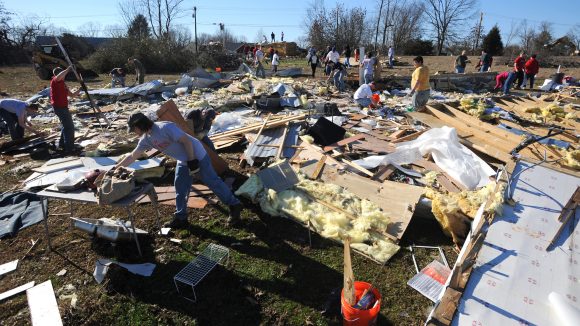Even with tracking devices and weather alerts, no one can predict exactly when and where a tornado might touch down. But, University of Mississippi experts say simple preparations before a natural disaster can mean the difference between life and death.
Chris Mullen, an Ole Miss civil engineering professor, has studied tornadoes and other natural disasters extensively for several years. A founding member of the Disaster Resistant University Committee on campus, the expert shared suggestions about how one might survive a twister and its terrifying impact.
“Because tornadoes are the disaster most likely to have the biggest impact, they are the DRU’s top priority,” Mullen said. “When one hit Oxford in 2008, it demolished a manufacturing facility, a church building, and a county facility.
“Smithville was hit by an EF5 tornado in 2011 and Holly Springs had one in 2016. From these, we see that more EF5 category tornadoes are definitely not out of the question.”

Citing research data he and others have compiled, Mullen offered the following tornado survival tips:
- Regularly conduct tornado drills in schools and workplaces. Everyone needs to be familiar with and follow the procedures most likely to keep them safe in the event of a tornado. This can be accomplished by routinely having evacuation exercises or getting to safe spaces.
- Keep access to National Weather Service alerts readily available. These can be found using the app on a cell or smartphone or by purchasing and maintaining a weather radio.
- If possible, have a personal storm shelter or access to a community storm shelter. If neither is readily available, go to the lowest level of a building or interior hallways away from glass windows and other possible sources of debris in the storm.
- Pay attention to NWS reports about the tornado’s path. The higher the EF level, the larger the swath of the twister and its potential to damage or destroy.
- Ride it out. Don’t move from your safe place until all warnings have ended and you receive official notification that you are no longer in danger of being hit by the tornado.
- Have a secure place for important papers. If you have insurance for your property in the event of a tornado or natural disaster, you will need to know where those policies are in the storm’s aftermath for coverage purposes. Keep important emergency numbers handy.
- Be prepared in case there is a delay in help arriving. In most cases, recovery efforts following a tornado are quick and effective. Have necessities, such as drinking water, first aid kits, and easy-to-prepare food nearby.
“Remember, getting out alive should always be the goal,” Mullen said. “The more prepared you are for a tornado, the better your chances for surviving it.”




